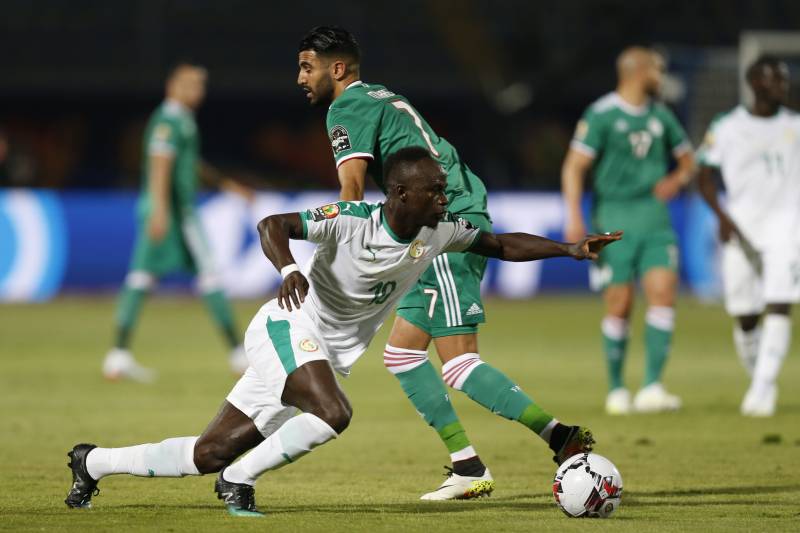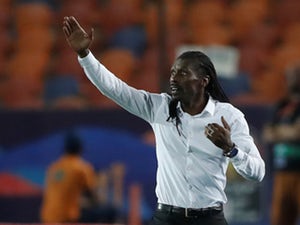
Senegal boss Aliou Cisse and Algeria coach Djamel Belmadi will be proud men when they lead their men to the Africa Cup of Nations final. This is the first occasion since 1998 that two natives have managed their nations to the final, and only the third time in the history of the tournament.
Anyone wanting to understand the significance and parallels between the finalists need only look to the sidelines. With echoes of the famous French squad that won the World Cup that year, Cisse and Belmadi both had upbringings in the multicultural suburbs of Paris, where they became childhood friends.
Both represented PSG in their formative footballing years, and they even came close as veterans, when Cisse, who is a day older than Belmadi, turned out for Portsmouth at the same time as his old ally played for rivals Southampton.
Only the confines of their technical areas will separate them in Cairo, but one of these bright young coaches is about to add the AFCON title to their illustrious career.
Senegal are in the final for the first time since 2002, when three names familiar to the Premier League – Cisse, Amdy Faye and El Hadji Diouf – missed their final three penalties in the shootout to condemn them to defeat against current holders Cameroon following a goalless draw after 120 minutes.
Seventeen years on, Cisse has the chance to avenge that heartbreak as the Senegal coach leads his country to their third tournament of his reign, having taken them to the AFCON quarter-finals two years ago and the group stages of the 2018 World Cup.
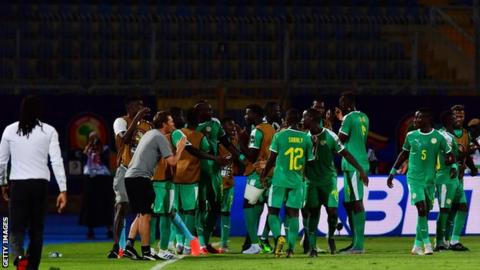
The Lions of Teranga have hardly been high-scorers on their way to the final, with Everton defensive midfielder Idrissa Gueye the only member of their squad to hit the net in almost five hours of play since Sadio Mane scored the only goal of the game in the round-of-16 against Uganda.
Their defensive record so far, however, has meant that a solitary goal has usually been all that they have required to progress. They have conceded just one goal in their last six matches – the team to break their resolve, intriguingly, was Algeria, who beat them 1-0 in the group stages.
Known as a no-nonsense player, Cisse maintains a pragmatic air about what is required to win a football match. Acknowledging that Tunisia had enough chances to win their semi-final before a piece of hapless goalkeeping secured Senegal’s progress via a 100th-minute Dylan Bronn own-goal, the long-serving coach pointed to fine margins as a charm of the game.
Cisse would doubtless prefer not to rely on similar knife edges in the final, setting up Senegal to play with a direct style that occasionally bypasses their industrious midfield in immediate search of their front three.
Mane is the lone Senegal player to have scored more than once at this year’s tournament, although his only strikes apart from that decisive goal in their first knockout game came in the form of two late goals during a 3-0 win over Kenya in the group stages.
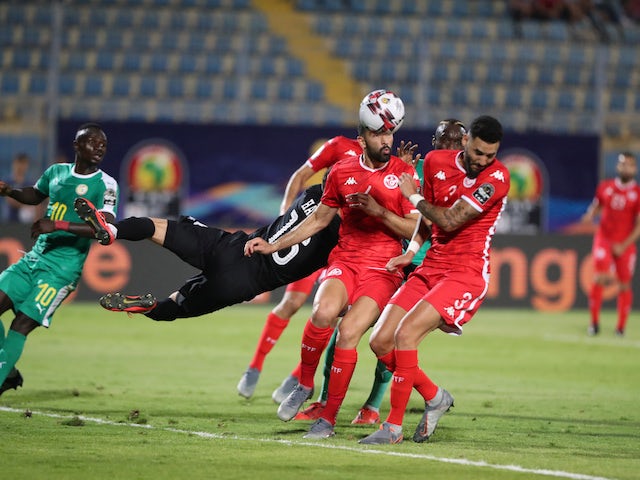
Having gone almost two-and-a-half hours without any of their players scoring, there is a sense that Senegal’s quality in attack will surely produce more chances in the final. They had just one shot on target during the semi-final – could the proximity of glory help them find their cutting edge?
While Senegal were tipped to at least reach the final by many pundits prior to the tournament, the Desert Foxes came into AFCON under little pressure, and proceeded to win their group in perfect fashion by keeping a clean sheet in all three of their wins.
Triumphing as underdogs against the Ivory Coast and Nigeria, they are in their third AFCON final and their first since 1990, when they won the tournament with a memorable team goal to beat Nigeria in the final, finished by Cherif Oudjani following a seven-pass build-up that began with their goalkeeper.
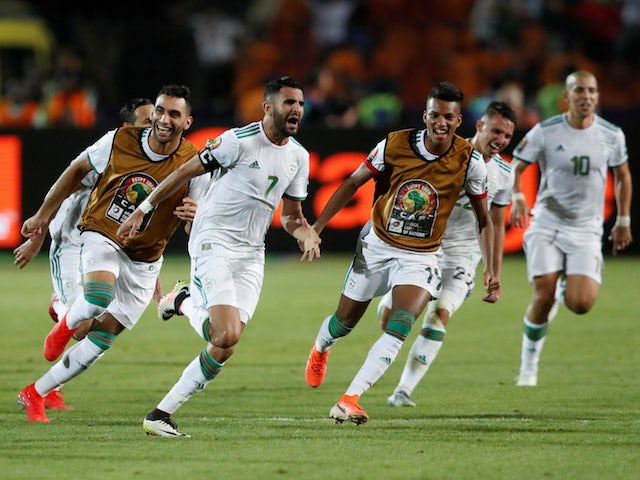
As is the unenviable quandary for any team facing Senegal, Algeria coach Belmadi’s greatest tactical challenge in the final is restricting the supply line to Mane and successfully shackling the Liverpool striker.
Algeria can take confidence from an excellent defensive record that has seen them concede just two goals throughout the tournament, the second of which was a late penalty as they kept dangerous semi-final regulars Nigeria at bay to reach the final.
At the other end, Algeria are the tournament top scorers with 12 goals – four more than Senegal and Nigeria, boosted by successive 3-0 wins over Tanzania and Guinea.
Algeria have never been behind at the tournament so far, although they endured a nail-biting conclusion to that quarter-final victory over the Ivory Coast, emerging with a 4-3 win on penalties after former Manchester City man Wilfried Bony and Serey Die missed spot-kicks.
Their semi-final also looked set for extra time before captain Riyad Mahrez sent them through with an exceptional last-gasp free-kick that underlined the midfielder’s Premier League-winning class.
Mahrez and teammate Adam Ounas, an exciting 22-year-old attacking midfielder for Napoli, will still be quietly hopeful of at least equalling Odion Ighalo’s five-goal tally that has made the Nigeria striker the current AFCON top scorer.
Deployed as a substitute, Ounas has averaged a goal for every 40 minutes he has spent on the pitch, but is unlikely to walk away with the golden boot unless injuries take their toll on Algeria. Mahrez will want to keep his aim, hitting the target with three-quarters of his attempts during his side’s run.
Senegal have a major concern at the back; Kalidou Koulibaly has played an integral role in their miserly defensive record, but the Napoli centre-back, increasingly regarded as one of the best defenders in Europe, collected a second yellow card in three matches in the semi-final, ruling him out of the final.
Koulibaly is likely to be replaced in a straight swap with Schalke’s Salif Sane, who at 28 is the same age as Koulibaly and has only 10 fewer caps than his compatriot’s total of 37. The question of whether the enforced switch will critically disrupt their side’s formidable defensive form is only likely to become clear once they are tested by Mahrez and friends.
With his electric pace and sharp movement, Mahrez profits from dragging defences out of position, leaving them confused about whether to step forward or leave a yard in anticipation of his frightening pace. That could mean Koulibaly’s leadership and positioning skills are sorely missed.
Captain Cheikhou Kouyate is best known as a central midfielder for Crystal Palace, but has been deployed as a centre-back for Senegal over the last few weeks and replaced Sane in defence when he was impeded by injury at the 2018 World Cup.

In theory, then, Sane and Kouyate should make a confident and experienced defensive pairing, although they have another stiff task in containing Baghdad Bounedjah, the scorer of a record 39 goals for Al Sadd in the Qatar Stars League last season, as well as a promising 12 goals in 26 games for his country since 2014.
The group stage result between the two sides owed much to Algeria’s narrow tactical setup prevailing against Senegal’s traditional reliance on incisive wing play and widemen willing to cut inside at speed, so Cisse may look to alter his approach in a bid to make life less predictable for Algeria.
For Algeria, Rennes right-back Mehdi Zeffane will continue to deputise for unfortunate Nice full-back Youcef Atal, who fractured his collarbone after half an hour against the Ivory Coast.
With the exception of that change, Belmadi has named the same starting lineup for each of Algeria’s knockout matches.
Senegal possible starting lineup:
Gomis; Gassama, Kouyate, Sane, Sabaly; Ndiaye, Saivet; Diatta, Gueye, Mane; Niang
Algeria possible starting lineup:
M’bolhi; Atal, Mandi, Benlamri, Bensebaini; Guedioura, Mahrez, Feghouli, Bennacer; Belaili, Bounedjah.
Head To Head
While the optimistic observer might suggest Senegal are long overdue a win against Algeria, the record books look ominous for Cisse and his players.
Senegal have not beaten Algeria in five encounters, losing four of them, and have never beaten these opponents at AFCON.
Algeria lost four in a row against Senegal between 2001 and 2008, although their last defeat in this clash was a late 1-0 defeat during qualifying for the 2010 World Cup.
Despite Algeria’s apparent dominance over the years, there is plenty of evidence to suggest that this will be another tight tussle at a tournament that has been almost uniformly characterised by close knockout games this year.
While Youcef Belaili’s crisp drive shortly after half time gave Algeria victory over Senegal earlier in the tournament, the eventual losers could well have had a penalty with less than 20 minutes remaining, when Mane seemed to be tripped in the box.
VAR was not used at this year’s AFCON until the quarter-final stage, but most onlookers felt the decision was a refereeing blunder and would have been corrected with the help of a replay.
Algeria were ahead twice when these sides met at the 2017 tournament. Leicester City striker Islam Slimani’s 10th-minute goal was cancelled out by Papa Diop, before Slimani and Senegal’s Moussa Sow scored within a minute of each other to set up a 2-2 draw in Gabon.
We say:
Senegal 2-1 Algeria.


